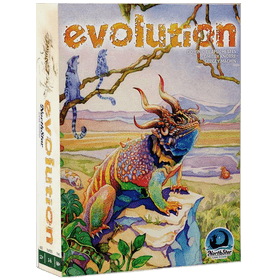evolution
 The goal of Evolution is to thrive in the midst of an ever-changing ecosystem where food is scarce and predators lurk.
The goal of Evolution is to thrive in the midst of an ever-changing ecosystem where food is scarce and predators lurk.
You will get points for feeding your species, increasing their population, and evolving them to best ensure their survival.
Niver a c'hoarierien: 2 - 6
Padelezh ar bartienn: 40 mn
Kemplezhded : 2 / 5
C'hoari da evolution pe da 1229 c'hoari all enlinenn.
Pellgargañ ret ebet - c'hoariit war-eeun adalek ho merdeer.
Gant ho mignoned ha miliadoù c'hoarierien/ezed en hollved.
Evit netra.

C'hoari da evolution pe da 1229 c'hoari all enlinenn.
Pellgargañ ret ebet - c'hoariit war-eeun adalek ho merdeer.
Gant ho mignoned ha miliadoù c'hoarierien/ezed en hollved.
Evit netra.

Diverradenn ar reolennoù
In the game Evolution, players adapt their species with traits to survive in an ever-changing ecosystem. Food is scarce and carnivores run rampant. Your choices will determine the fate of the world's species: which will survive, which will thrive, and which will disappear from the planet forever.
The goal of Evolution is to gain the most points by feeding your species, increasing their population, and evolving them to best ensure their survival.
At the end of the game, players get points for the food their species have eaten during the game, the Population of their surviving species and the Trait Cards on their surviving species.
Gameplay
A game of Evolution is played over a variable number of rounds. There are 4 phases in each round.
Receiving cards
Each player receives 3 cards, plus 1 card for each species they have in front of them. If the deck needs to be shuffled during this phase, this will be the last round of the game.
Selecting Food
You secretly choose 1 Trait Card from your hand, which is added facedown on the Watering Hole.
These are the "Food Cards" that will be revealed during the Feeding Phase to determine how much Plant Food will be available for the round. The number at the bottom right of each Trait Card represents an amount of Plant Food.
Playing cards
Starting with the First Player, you may play as many Trait Cards as you wants, or save them for the next round. There are three things you can do (in any order) with each Trait Card:
• Play a Trait : you may place a Trait Card facedown above one of your species. A species may not have any duplicate Trait Cards and may not have more than 3 Trait Cards (2 in a two-player game).
A player may discard a trait off of one of their species for free during their turn. This can be done to make room for a new trait if a species already has the maximum number of Trait Cards.
• Create a new Species : you may discard a Trait Card face-up into the discard pile to get a new species. This Species starts with a Body Size "1" and Population "1". The new species must be placed to the left or the right of his existing species; they may not be placed between existing species.
• Increase Body Size or Population : you may discard a Trait Card face-up into the discard pile to increase the Body Size or Population of any one of their species by 1.
When everyone has played cards, all of the played Trait Cards are flipped face-up.
Feeding
The Food Cards on the Watering Hole are revealed, the food numbers on these cards are added, and that much Plant Food are added from the Food Bank onto the Watering Hole.
If the total on the Food Cards is a negative number, that much Plant Food are removed from the Watering Hole (if possible). The revealed Food Cards are discarded.
Beginning with the First Player and continuing clockwise, each player must feed one of their Hungry species, according to the Species Traits. A Species is Hungry if it has less food than its Population. A Species which is no longer Hungry can no longer receive extra food.
When a species takes food, it is placed in the space above the Population track starting with the "1" Population space. Any food eaten will be worth 1 point at the end of the game.
• non-carnivore : you add 1 Plant Food from the Watering Hole onto your Species board
• carnivore : carnivores can never take Plant Food. They feed by attacking other Species. You can attack another Species if your Body Size is larger than theirs and you have the necessary traits to overcome the defensive traits of the attacked Species. After an attack, you add Meat Food equal to the Body Size of the attacked Species from the reserve and the attacked Species population is reduced by 1.
If a Species population reaches 0, it goes extinct. The Food that had been eaten by this Species is put in the owner's bag, and that Species is discarded (board and traits). You draw back one trait for each that was discarded.
Once every Species is no longer Hungry or can no longer feed, the feeding phase ends.
- If a species did not eat food equal to its Population, its Population is reduced to the amount of food eaten. If a species did not eat any food, it goes Extinct.
- All of the eaten Foods are put in the respective player's bags.
- If you have no surviving Species, you receive a new one.
- The First Player token passes to the next player.
Ending and Scoring
Once the deck runs out, the game ends at the end of that round.
You receive 1 point per :
• food token in your bag
• population for your surviving Species
• Trait cards on your surviving Species
If there is a tie, the player with the most Trait Card points is the winner. If there is still a tie, the player with the most Population points is the winner.
2-Player rules
40 Trait cards are removed at random from the deck at the beginning of the game.
Your Species can only have 2 Traits cards instead of 3.
Quick variant and 6-player rules
The Playing card phase is played simultaneously by all players.

